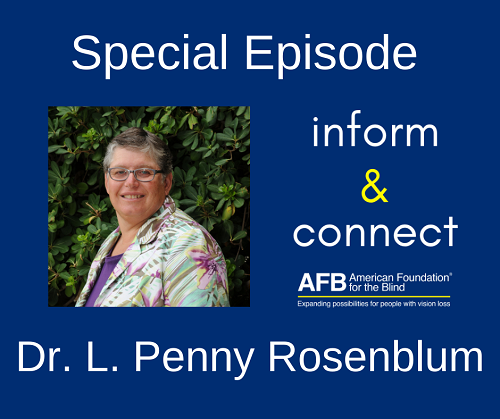AFB Blog
Latest Posts
We Need Your Voice
We know that families of blind and low vision children are still facing major challenges as the ongoing COVID-19 pandemic has forced many schools to move to online education. As a person with low vision who received my elementary education before the first version of the Individuals with Disabilities Education Act (IDEA) was passed in 1975, I think of the changes my own mother created for me to receive an equitable education to my sighted peers. My mother let the school administration and…
It Takes a Village: Join the Access and Engagement Village and Advocate for the Education of Students with Visual Impairments
Earlier this year, a 10-member research team spent four months analyzing heaps of data from the first Access and Engagement study. With responses from 1,432 individuals in the U.S. and Canada who represented the voices of 455 children, 710 teachers of students with visual impairments (TVIs), 138 O&M specialists, and 180 dually certified professionals, this study is the largest we know of relating to the education of students with visual impairments. For all children, families, and…
Recap and Resources from the Second AFB Town Hall
Thank you so much to everyone who was able to join the second AFB Town Hall on the impact of COVID-19 on access to employment and technology for Americans who are blind or have low vision, drawing on findings from the Flatten Inaccessibility Report. A complete archive will be available soon, for anyone who missed the live conversation. As promised, here are some of the resources shared by the presenters and attendees: Dr. Rosenblum recently published an op-ed in the Arizona Daily Star:…
What We're Reading: Voting
The 2020 elections are upon us and, unsurprisingly, the act of voting is dominating the headlines. With that in mind, here's a brief roundup of stories that caught our attention, with an emphasis on the voting experience for people with disabilities. Florida Officials Aim To Make Voting Easier For People With Disabilities—NPR, November 2, 2020 Several Florida counties are trying out a new system to help voters with disabilities have more privacy when they cast their ballots. What Does…
AFB Director of Research Pens Arizona Daily Star Op-Ed Examining Life for People Blind or Low Vision During Pandemic
In her October 28 Arizona Daily Star op-ed “I have impaired vision. COVID has made daily life much tougher,” AFB’s Director of Research Dr. L. Penny Rosenblum shares her experiences navigating daily life since the COVID-19 pandemic, and shares findings from AFB’s Flatten Inaccessibility report, which examined the impact of COVID-19 on adults with visual impairments in the United States early in the outbreak. Dr. Rosenblum writes: “As a low-vision person, COVID-19 has impacted my life in…
Recap and Resources from the First AFB Town Hall
Thank you so much to everyone who was able to join the first AFB Town Hall on the impact of COVID-19 on access to healthcare, transportation, and voting for Americans who are blind or have low vision. A complete archive will be available soon, for anyone who missed the live conversation. As promised, here are some of the resources shared by the presenter and attendees: Aira announced support for voting in the upcoming election. Another visual assistance option is the BeMyEyes app, which is…
What We’re Reading: “Supreme Court Blocks Curbside Voting”
NPR, October 21, 2020: Supreme Court Blocks Curbside Voting In Alabama, An Option During Pandemic One of the quotes that really stuck out from AFB’s Flattening Inaccessibility survey was a story about curbside voting. “I voted in the primaries, but the polling place did not have a ramp, and though they offered to bring the portable voting booth out, they would only do that if you parked your car in the designated spot. Since we got dropped off by Lyft, we did not have a car. So, two…
Inform & Connect, Special Episode: Dr. L. Penny Rosenblum, Lead Author, Flatten Inaccessibility

In this special edition of AFB's Inform & Connect podcast, Dr. L. Penny Rosenblum discussed the Flatten Inaccessibility research report, the culmination of survey findings from 1,921 U.S. participants who are blind (65%) or have low vision (35%). The survey investigated the experiences of these participants during the start of the COVID-19 pandemic to determine how they were affected in areas including access to transportation, healthcare, access to food and supplies, employment…
Neva Fairchild Appointed to Texas Governor’s Task Force On Disaster Issues Affecting Persons Who Are Elderly And Persons With Disabilities
On October 14, Texas Governor Greg Abbott appointed ten individuals to the Task Force on Disaster Issues Affecting Persons who are Elderly and Persons with Disabilities; among its members is AFB’s National Aging and Vision Loss Specialist Neva Fairchild. The Task Force on Disaster Issues Affecting Persons Who Are Elderly and Persons Who Are Disabled will study methods to more effectively accommodate persons who are elderly and persons with disabilities before, during, and after a disaster…
AFB Town Halls
The Flatten Inaccessibility report examined the impact of COVID-19 on 1,921 adults with visual impairments and the Access and Engagement survey examined the impact of COVID-19 on the education of 455 children and 1,028 teachers of students with visual impairments and orientation and mobility specialists. These reports contain a wealth of information on timely topics important to those with visual impairments, family members, educators, employers, policymakers, and anyone else who is…